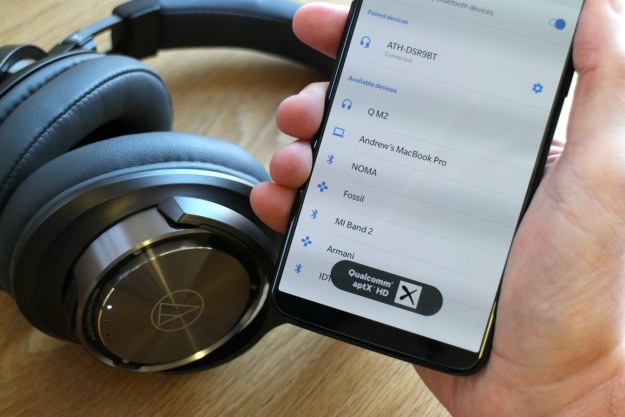Never in the history of headphones — and particularly in the history of the wireless variety — has someone said: “You know what? I’d like the ones with the worse audio quality.” Just doesn’t happen. And to that end, Qualcomm today announced the latest iteration to the aptX standard, called aptX Lossless.
Building on aptX Adaptive, which brought HD-quality audio with dynamic bit rates when it was announced in August 2018, aptX Lossless takes things that much further, and is designed to give listeners CD-quality, 16-bit, 44.1kHz lossless audio. The gist is that if you’re using hardware that supports aptX Lossless, and are listening to a lossless music file, and the radio frequency conditions are just right, you’ll get the best wireless sound possible from the Qualcomm tech.
That’s quite a few variables, at least until all the pieces come together. And the first hardware isn’t expected until later in the year, Qualcomm said in a press release, without letting slip exactly where we’ll see it first. Nor does any of that tell us whether it’s something your run-of-the-mill Spotify listener would notice, or if it’s only something for audiophiles to enjoy. That’s actually a trick question since Spotify doesn’t do lossless just yet — Spotify HiFi is coming later this year — but you get the point. And it doesn’t yet change the fact that you may well need to have an Android phone to make the most use out of this in the immediate future.

“At Qualcomm Technologies we’re excited about the future of sound, and we’re continually looking for ways to help our customers deliver new and exciting listening experiences,” James Chapman, vice president and general manager for Qualcomm Technologies International, Ltd., said in a press release. “Lossless audio means mathematically bit-for-bit exact, with no loss of the audio file, and up to now the necessary bit rate to deliver this over Bluetooth has not been available. With many leading music streaming services now offering extensive lossless music libraries, and consumer demand for lossless audio growing, we’re pleased to announce this new support for CD lossless audio streaming for Bluetooth earbuds and headsets, which we plan to make available to customers later this year.”
Here are the technical specs, per Qualcomm:
- Supports 44.1kHz, 16-bit CD lossless audio quality
- Designed to scale up to CD lossless audio based on Bluetooth link quality
- User can select between CD lossless audio 44.1kHz and 24-bit 96kHz lossy
- Auto-detects to enable CD lossless audio when the source is lossless audio
- Mathematically bit-for-bit exact bit rate approximately 1Mbps
The whole thing works with Qualcomm’s full software stack, as part of Qualcomm Bluetooth High Speed Link. We’ll see data rates above 1Mbit per second, and all the way down to 140kbits per second in a congested RF environment, Qualcomm says, to keep the music playing without dropouts or any of those annoying glitches that we’ve all experienced at some point.
“Sound quality is the most critical purchase driver across all audio devices according to our 2021 State of Sound survey, which also shows increasing demand for higher-quality streaming audio. Over half of respondents are seeking either lossless or high-resolution audio quality, and a massive 64% saying that lossless audio quality is likely to influence their decision to purchase wireless earbuds,” Chapman said. “Currently, lossless audio is only supported on client devices such as phones, PCs, and tablets. By supporting lossless audio on next-gen earbuds and headphones, we’re providing our customers another way to deliver sound the way the artist intended, as well as a significant opportunity to differentiate and be among the first to develop products with this feature.”
Editors' Recommendations
- Next-gen wireless headphones will get lossless hi-res audio with a little help from Qualcomm
- Qualcomm’s Snapdragon X75 ushers in the next era of 5G connectivity
- AptX Adaptive vs. aptX HD vs. LDAC: Which Bluetooth codec is the best?
- What is aptX? Cutting through the clutter of Qualcomm’s codecs
- Bose QuietComfort Earbuds II will get lossless, Snapdragon Sound in 2023




